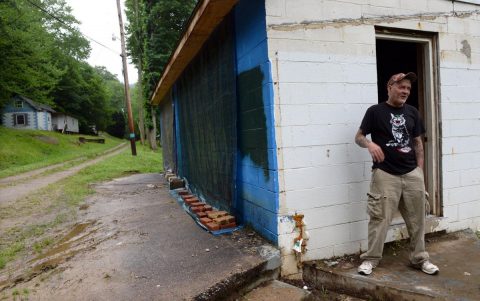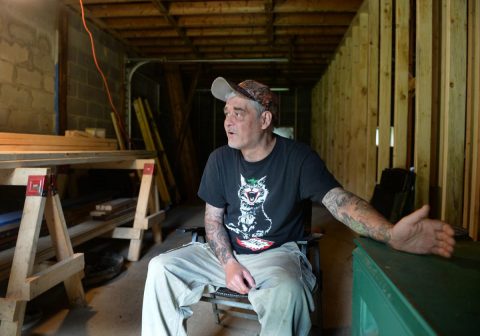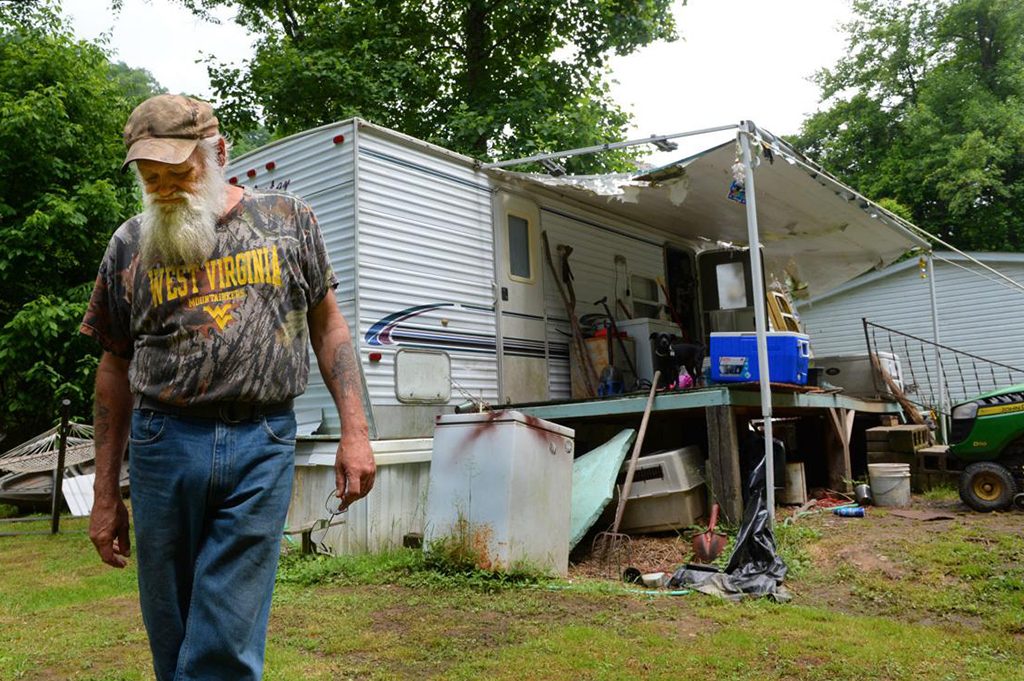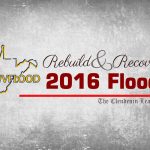Dana Godbey stands outside of the camper in Procious where he’s lived since the June 2016 flood. Kenny Kemp | Gazette-Mail
By: Lori Kersey, Staff Writer | Posted: May 23, 2018 | Source: WV Gazette-Mail
PROCIOUS — Some survivors of the June 2016 flood say a program meant to help them repair and rebuild their homes has been a “nightmare” to deal with and has not provided the help it promised.
State officials have called for an investigation into the program.

Mike Cahill stands outside of his garage-home in Procious. Cahill said he’s lived there and at his mother’s home since the June 2016 flood. A state program called RISE has been no help, he said. State officials have called for an investigation into the program. Kenny Kemp | Gazette-Mail
Mike Cahill, of Procious, Clay County, lost his home in the flood and applied to the RISE West Virginia Disaster Recovery Housing Program for help.
Cahill, 51, said he’s been living in his garage and in his mother’s house since the flood nearly washed away his house, which then had to be demolished.
Cahill was told in a letter from RISE in January that, for the program to help him rebuild a home, he would have to pay back the $31,000 in disaster assistance he got from the Federal Emergency Management Agency.
RISE was funded by a community development block grant through the U.S. Department of Housing and Urban Development and administered by the West Virginia Department of Commerce.
Cahill said FEMA and HUD have different rules for flood survivors to follow when spending their assistance money.
“FEMA told flood victims you could buy clothes, furniture; you could buy things you lost,” Cahill said. “Eight months [later], RISE shows up, the head of the snake being HUD, which is [their rules are to spend money only on] four walls and a roof, four walls and a roof.”
Cahill said he spent his FEMA money repairing his garage, storage building and well house.
Cahill said he’s refused to give back the FEMA money. A representative from the state Department of Commerce has been reviewing the receipts from what he spent the money on.
Cahill, who’s on disability, lives on $14,000 a year, he said.
“If I give you my money back, that means I can’t finish buying my clothes,” Cahill said. “I can’t buy the other things that I need, but you’re going to wave a set of keys to a shiny new house. I said. ‘I’ll personally shove ’em up your ass. I don’t care.’ ”
Cahill said he lived in his garage throughout the winter. He’s afraid to leave his house and property for too long because thieves steal from him.
“I have this tarped off,” he said of the garage. “I’m from Chicago. I can handle the cold weather.”
Cahill said he’ll do what it takes to fight for himself and for other flood survivors. He’s been calling his elected representatives and has considered filing a class-action lawsuit on behalf of flood victims.

Mike Cahill talks about being denied money to rebuild his home that was damaged in the June 2016 flood. Kenny Kemp | Gazette-Mail
“Everybody is done, they’re giving up,” Cahill said. “I’ve talked to so many people who’ve given up. They just don’t care anymore. The way they’ve been treated like a criminal. Yes, there are scumbags out here taking advantage of the situation. I totally agree. Everybody needs to be investigated, but I should not walk up to you as if you’ve ripped off the system. That’s what they’re doing.”
Clay Mayor Jason Hubbard said he’s talked to 10 to 15 flood survivors who have had problems with RISE. Hubbard said the main issues seem to be related to “duplication of funds.” RISE tells survivors they shouldn’t have spent money on clothing, furniture and other necessities and they must give it back to receive help.
After he heard of the problems with the program, Hubbard held a meeting with elected officials and representatives from RISE and other flood recovery agencies.
“Some people have just given up, as far as I understand,” Hubbard said of flood survivors.
Pam Street lost her home in the flood and has been renting a trailer in Procious since then. Street said dealing with the program “has been a nightmare.”
Street said she has had five different case managers with RISE since July, and they all tell her something different about what she’s eligible for.
“Two people have told me that they did an environmental inspection on my property in order to get my house put back up there, and then the third person told me that hasn’t been done yet,” she said.
Street said she’s never gotten a straight answer from RISE about what assistance she’ll get.
“They will help you replace what you lost,” she said. “I had a double-wide [mobile home]. Well, then they said they could only do a single-wide, which I don’t care, if I had a home of my own. But then they said, yes, they can do a double-wide. So I don’t know.”
Street said she was at first denied because she made too much money, but the agency didn’t take into account that she’d be retiring. Then she was approved.
She said the last she’d heard from the agency, a representative told her she would be in a new home before summer. As of Wednesday, though, she hadn’t received any help.
“It’s almost two years [after the flood],” Street said. “And it’s just like one thing after another — promises and different stories. You just don’t know what to think. Just keep on going. That’s all you can do.”
Dana Godbey, 61, has been living in a camper since the flood washed out the riverbank from behind his home on Elk River Road, in Procious.
Godbey said the RISE program told him he was approved for help and sent him a diagram of a manufactured home. He said he then requested a double-wide home and was put on hold until next month.
“That’s when I’m supposed to call back and find out if I’ve been approved or not approved for the double-wide,” Godbey said.
Godbey said FEMA gave him $1,200 and told him to move. A contractor estimated that it would take nearly $90,000 to fix the riverbank, he said.
“I’d just like to see [RISE] get busy and do something,” Godbey said.
Reach Lori Kersey at lori.kersey@wvgazettemail.com, 304-348-1240 or follow @LoriKerseyWV on Twitter.








